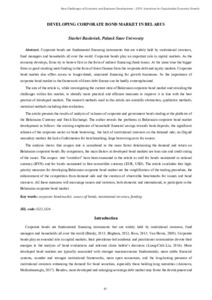Пожалуйста, используйте этот идентификатор, чтобы цитировать или ссылаться на этот ресурс:
https://elib.psu.by/handle/123456789/25227Полная запись метаданных
| Поле DC | Значение | Язык |
|---|---|---|
| dc.contributor.author | Baslaviak, S. | - |
| dc.date.accessioned | 2020-06-30T11:21:06Z | - |
| dc.date.available | 2020-06-30T11:21:06Z | - |
| dc.date.issued | 2019 | - |
| dc.identifier.citation | Baslaviak, S. Developing Corporate Bond Market In Belarus / S. Baslaviak // New Challenges of Economic and Business Development – 2019: Incentives for Sustainable Economic Growth : Proceedings, Riga, Latvia, 16–18 мая 2019 года. – Riga, Latvia: University of Latvia, 2019. – P. 43-52. | ru_RU |
| dc.identifier.uri | https://elib.psu.by/handle/123456789/25227 | - |
| dc.description.abstract | Corporate bonds are fundamental financing instruments that are widely held by institutional investors, fund managers and households all over the world. Corporate bonds play an important role in capital markets. As the economy develops, firms try to borrow first in the form of indirect financing (bank loans). At the same time the bigger firms in good standing seek funding in the form of direct finance from the corporate debt and equity markets. Corporate bond market also offers access to longer-dated, unsecured financing for growth businesses. So the importance of corporate bond market in the framework of direct debt finance can be hardly overemphasized. The aim of the article is, while investigating the current state of Belarusian corporate bond market and revealing the challenges within this market, to identify more practical and efficient measures to improve it in line with the best practice of developed markets. The research methods used in this article are scientific abstraction, qualitative methods; statistical methods including data evaluation. The article presents the results of analysis of volumes of corporate and government bonds trading at the platform of the Belarusian Currency and Stock Exchange. The author reveals the problems in Belarusian corporate bond market development as follows: the existing emphasize of household financial savings towards bank deposits; the significant reliance of the corporate sector on bank borrowing; the lack of institutional investors on the demand side; an illiquid secondary market; the lack of information for benchmarking; large borrowing costs for issuers. The analysis shows that coupon rate is considered as the main factor determining the demand and return on Belarusian corporate bonds. By comparison, the main factors at developed bond markets are loan size and credit rating of the issuer. The coupon rate “corridors” have been examined in the article as well for bonds nominated in national currency (BYN) and for bonds nominated in free-convertible currency (EUR, USD). The article concludes that highpriority measures for developing Belarusian corporate bond market are the simplification of the trading procedure, the enhancement of the competition from demand side and the creation of observable benchmarks for issuers and bond investors. All these measures will encourage issuers and investors, both domestic and international, to participate in the Belarusian corporate bond market. | ru_RU |
| dc.language.iso | en | ru_RU |
| dc.publisher | Riga : University of Latvia | - |
| dc.subject | corporate bond market | ru_RU |
| dc.subject | issuers of bonds | ru_RU |
| dc.subject | institutional investors | ru_RU |
| dc.subject | funding | ru_RU |
| dc.title | Developing Corporate Bond Market In Belarus | ru_RU |
| dc.type | Article | ru_RU |
| dc.citation.spage | 43 | ru_RU |
| dc.citation.epage | 52 | ru_RU |
| Располагается в коллекциях: | Публикации в Scopus и Web of Science | |
Файлы этого ресурса:
| Файл | Описание | Размер | Формат | |
|---|---|---|---|---|
| Baslaviak, S. Developing Corporate Bond Market In Belarus.pdf | 449.78 kB | Adobe PDF |  Просмотреть/Открыть |
Все ресурсы в архиве электронных ресурсов защищены авторским правом, все права сохранены.